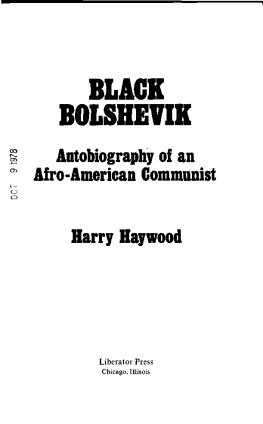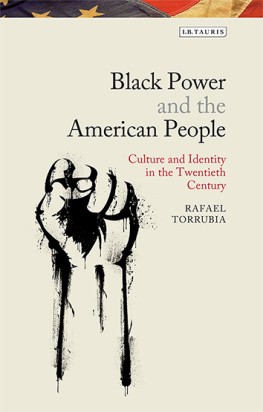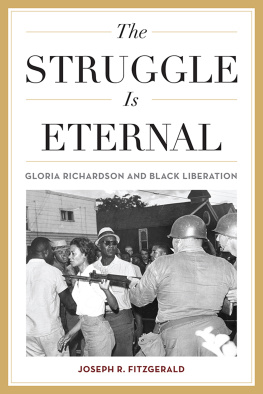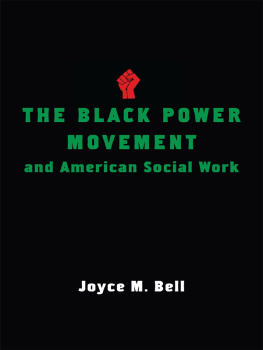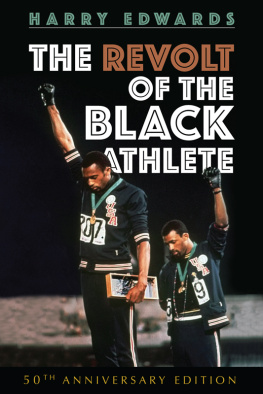Copyright 1978 by Harry Haywood All rights reserved
No part of this publication may be reproduced or transmitted in any form or by any means, electronic or mechanical, including photocopy, recording or any information storage and retrieval system without permission in writing from the publisher, except by a reviewer who wishes to quote brief passages in connection with a review written for inclusion in a magazine, newspaper or broadcast.
ISBN: 0-930720-52-0 (clothbound) 0-930720-53-9 (paperbound)
Library of Congress Catalog Card Number: 77-077464
Manufactured in the United States of America
Liberator Press, Chicago, Illinois
To My Family,
Gwen, Haywood, Jr., and Becky
Acknowledgments
There have been many friends and comrades who have, directly or indirectly, helped me with the writing of this book. Unfortunately, they are too numerous to all be named here.
There are a number of young people who have helped with the editorial, research and typing tasks and helped the project along through political discussions. Special thanks to Ernie Allen, who gave yeoman help with the early chapters. Others whose assistance was indispensable include Jody and Susan Chandler, Paula Cohen, Stu Dowty and Janet Goldwasser, Paul Elitzik, Pat Fry, Gary Goff, Sherman Miller, John Schwartz, Lyn Wells and Carl Davidson. Others who gave me assistance are Renee Blakkan and Nathalie Garcia.
Over the past years, I have had discussions with several veteran comrades and friends who have helped immeasurably in jogging my memory and filling in the gaps where my own experience was lacking. I extend my warmest appreciation to Jesse Gray, Josh Lawrence, Arthur and Maude (White) Katz, John Killens, Ruth Hamlin, Frances Loman, A1 Murphy, Joan Sandler, Delia Page and Jack and Ruth Shulman.
A political autobiography is necessarily shaped by experiences over the years and by comrades who helped and influenced me in the long battle for self-determination and against revisionism. My earliest political debts are to the first core of Black cadres in the CPUSA: Cyril Briggs, Edward Doty, Richard B. Moore
and to my brother Otto Hall, all former members of the African Blood Brotherhood.
To Harrison George, outstanding son of the working class, charter member of the CPUS A, former editor of the Daily Worker and the Peoples World, who gave his all to the Communist movement and died alone, victimized for his premature antirevisionism.
A special tribute to my comrades in the battles against revisionism within the CPUS A and after: A1 Lannon, veteran director of the Waterfront Section and member of the Central Committee of the CPUSA; Charles Loman, executive secretary of the Brooklyn Party Organization; Isidore Beagun, executive secretary of the Bronx Party Organization; Allen and Pearl Lawes, A1 and Ruth Hamlin, Olga and Victor Agosto. And to my wife, Gwendolyn Midlo Hall, my closest collaborator from 1953 through 1964 in the writing of manuscripts as well as in the political battles, who has since established her own reputation as historian and essayist.
A tribute to Ed Strong, former communist youth leader and director of the Southern Negro Youth Congress, whose premature death in the mid-fifties cut short his uncompromising stand within the Central Committee for the right of self-determination for the Black nation.
To the editors of Soulbook Magazine, who published my writings in 1965-66 and invited me to Oakland, California, in the spring of 1966 during the formative stages of the Black Panther movement.
To Vincent Harding, who provided me with funds to return to the U.S. from Mexico in 1970 and gave me technical and material assistance to begin this autobiography.
Thanks to John Henrik Clarke and Francisco and Elizabeth Cattlett de Mora for their enthusiasm and moral support.
To Robert Warner, Director of the Michigan Historical Collections, for his help and his sensitivity to the need to collect and preserve historically relevant materials from the Black movement in the United States.
Contents
12 RETURN TO THE HOMEFRONT:
Index
BLACK
BOLSHEVIK
Prologue
On July 28, 1919,1 literally stepped into a battle that was to last the rest of my life. Exactly three months after mustering out of the Army, I found myself in the midst of one of the bloodiest race riots in U.S. history. It was certainly a most dramatic return to the realities of American democracy.
It came to me then that I had been fighting the wrong war. The Germans werent the enemythe enemy was right here at home. These ideas had been developing ever since I landed home in April, and a lot of other Black veterans were having the same thoughts.
I had a job as a waiter on the Michigan Central Railroad at the time. In July, I was working the Wolverine, the crack Michigan Central train between Chicago and New York. We would serve lunch and dinner on the run out of Chicago to St. Thomas, Canada, where the dining car was cut off the train. The next morning our cars would be attached to the Chicago-bound train and we would serve breakfast and lunch into Chicago.
On July 27, the Wolverine left on a regular run to St. Thomas. Passing through Detroit, we heard news that a race riot had broken out in Chicago. The situation had been tense for some time. Several members of the crew, all of them Black, had bought revolvers and ammunition the previous week when on a special to Battle Creek, Michigan. Thus, when we returned to Chicago at about 2:00 P.M. the next day (July 28), we were apprehensive about what awaited us.
The whole dining car crew, six waiters and four cooks, got off at the Twelfth Street Station in Chicago. Usually we would stay on the car while it backed out to the yards, but the station seemed a better route now. We were all tense as we passed through the station on the way to the elevated which would take us to the Southside and home. Suddenly a white trainman accosted us.
Hey, you guys going out to the Southside?
Yeah, so what? I said, immediately on the alert, thinking he might start something.
If I were you I wouldnt go by the avenue. He meant Michigan Avenue which was right in front of the station.
Why?
Theres a big race riot going on out there, and already this morning a couple of colored soldiers were killed coming in unsuspectingly. If I were you Id keep off the street, and go right out those tracks by the lake.
We took the trainmans advice, thanked him, and turned toward the tracks. It would be much slower walking home, but if he were right, it would be safer. As we turned down the tracks toward the Southside of the city, towards the Black ghetto, I thought of what I had just been through in Europe and what now lay before me in America.
On one side of us lay the summer warmness of Lake Michigan. On the other was Chicago, a huge and still growing industrial center of the nation, bursting at its seams; brawling, sprawling Chicago, hog butcher for the nation as Carl Sandburg had called it.
As we walked, I remembered the war. On returning from Europe, I had felt good to be alive. I was glad to be back with my familyMom, Pop and my sister. At twenty-one, my life lay before me. What should I do? The only trade I had learned was waiting tables. I hadnt even finished the eighth grade. Perhaps I should go back to France, live there and become a French citizen? After all, I hadnt seen any Jim Crow there.
Had race prejudice in the U.S. lessened? I knew better. Conditions in the States had not changed, but we Blacks had. We were determined not to take it anymore. But what was I walking into?

